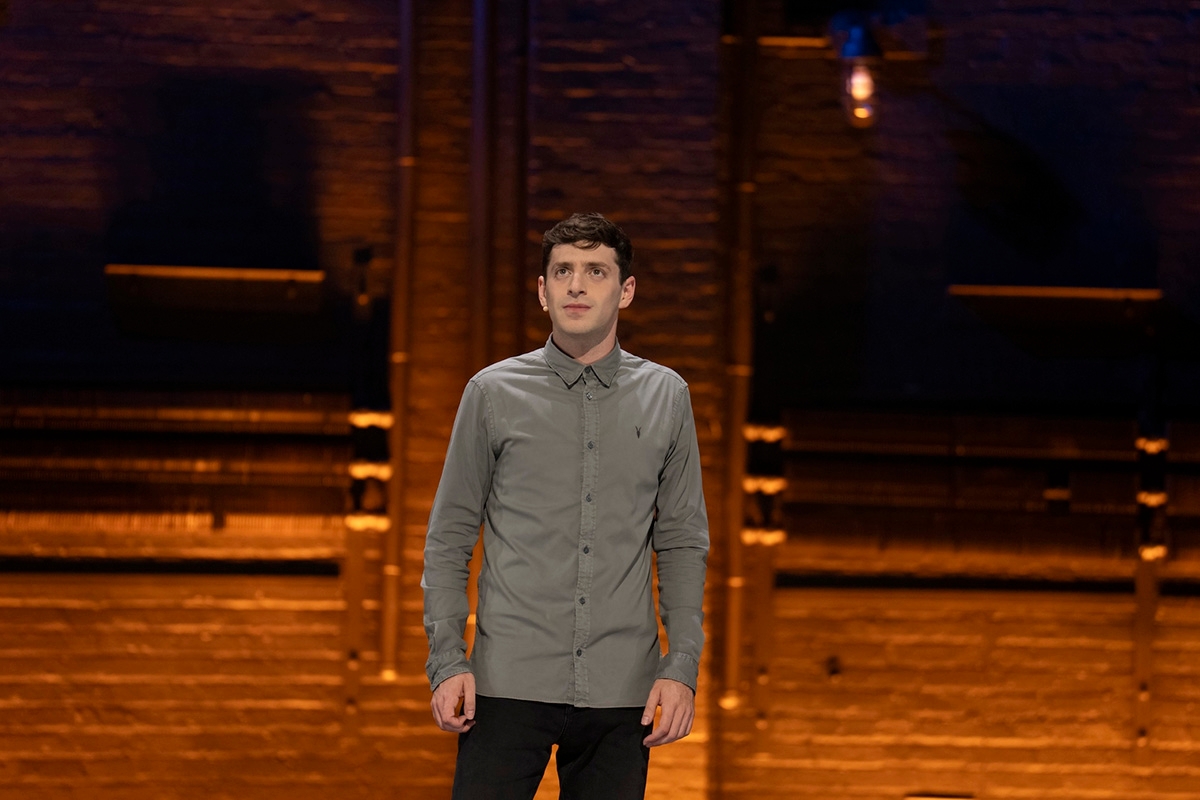“Just For Us,” the Alex Edelman comedy special that premiered on Max this weekend, is blanketed by jokes about Robin Williams and his gorilla friend, Koko. Edelman lauds the late actor and comedian as “the great connector,” a man whose humor transcends even the cross-species barrier. Despite not being Jewish, Williams also happened to be quite wonderful at relaying Jewish stories (he even joked about becoming a rabbi once) which Edelman does skillfully in this special, which is centered around the time the Jewish comedian decided to “crash” a white supremacist meeting in Queens.
Edelman first started performing “Just for Us” back in 2018, in Melbourne, in an era when antisemitism ran rampant on Twitter (some things never change), which is where he first learned of the meeting for people with questions about their “whiteness.” And though it’s been several years since that meeting, the themes Edelman explores — about antisemitism and assimilation — seem to grow more and more relevant every passing year, making now a perfect moment for a show like this to find its biggest audience yet.
Throughout the special, Edelman runs back and forth on the stage, slamming chairs, practicing sign language and quite physically barreling through this masterful, funny show. The title refers to a particularly brutal line delivered towards the end that I dare not spoil except to say it is arresting, and also works as a kaleidoscope throughout the show, with Edelman spinning around its many meanings.
It seems that some of the jokes within the special are just for us Jewish viewers. While he does define certain Jewish words and rituals, sometimes humorously, and sometimes more like a Hebrew teacher might, some asides he leaves unexplained — like how he should have first realized he was Jewish at eight days old. Edelman broaches a lot of divides about Jewish observance and what it means to be “really Jewish” depending on who you’re with. To his friends, he’s a rabbi; to his Jewish parents and his Orthodox Jewish community, he’s a heretic; to people in that room in Queens, he is the root of all evil.
The experience that Edelman describes of being in that room in Queens with over a dozen white supremacists — not the brightest bunch, he says — is one that probably most of us haven’t experienced literally, but feels familiar all the same. We have all been the Jew in the room trying to hide our Jewishness in some way, whether it’s a connection to Israel, our level of observance, our Jewish humor, our otherness. Since Jews came to the United States, we have been in rooms like that Queens apartment, and we have let those rooms change us, sometimes for the worse, and sometimes for the better.
The feelings that the experience drummed up for Edelman are very real and universal. There’s the desire praise himself for being the one good person in the room — “the one just man in Sodom” — and also the deep desire to unconditionally fit in, to pass for once. He isn’t there to throw these people’s prejudices in their face. He is there to test whether or not he can act and be, convincingly, one of them.
Edelman is, like the majority of American Jews, Ashkenazi. And like the majority, but not all, of Ashkenazi Jews, he’s white — or what some Jews prefer to call “white-presenting.” Edelman doesn’t use that definition, but he does get at it when describing his Jewish childhood in Boston, realizing the ways his Jewish identity kept him apart from the more mainstream experience of whiteness. While he can sometimes go into a room and hide his Jewishness, as he says in the special, people can still usually tell that he is Jewish — because of how he looks, how he talks, and because every aspect of his personality is tinged with Yiddishkeit.
Edelman jokes that his humor “barely works if you’re not from the Upper West Side,” and yet, like Williams, he becomes a great connector, and among some great non-Jewish jokes, elucidates so many truisms about the American Jewish experience that many don’t know, making them digestible and enjoyable for any viewer. He also touches on something universal about the Jewish American experience of wanting to belong and sometimes only showing the parts of ourselves that are palatable and acceptable in every room.
When he first crafted the show, he couldn’t have known it would make its way to a major streaming platform six months after the October 7 attack in Israel and the ensuing war. And so he couldn’t have known how relevant this all would feel, with so many of us in the Jewish community torn between our Jewish identity, our tribal instincts, and our desire to assimilate or be considered the “good Jew.”
As I watched Edelman’s special, I thought about another piece of art created pre-October 7 that has stayed with me. “The Ally,” a play that just ended its run at New York’s Public Theater, tells almost the inverse story of “Just For Us,” about a college professor in a progressive space who is also longing to feel like a good person, and who also grapples with questions about Jewishness, whiteness and assimilation. Both pieces leave you with more questions than answers on these topics — a great Jewish tradition.
In the end, “Just for Us” is profoundly funny — in both the “just for us” moments of being seen as Jews, but also in the way that Edelman — a self-professed lover of “dumb and simple” jokes — delivers each line. One of my favorite jokes is actually about cocaine and ADHD medication. Like other great connectors, including the comedians of the Borscht Belt, Edelman brings Jewish humor to a mainstream audience in a way that both feels timeless and new.








